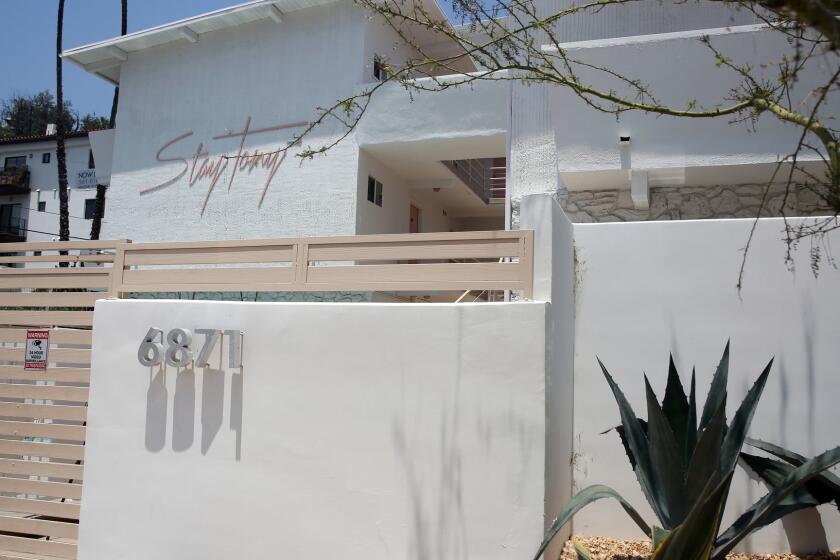You can buy ‘cheap’ in L.A. But you won’t own your home and may oust a renter

- Share via
In April, a two-bedroom unit in a 1920s Silver Lake fourplex sold for about $530,000. The Spanish-style home was recently renovated and has a seemingly choice location — a short walk from restaurants on Sunset Boulevard. Still, it sold for about $250,000 less than the median price of a two-bedroom condo in the neighborhood.
A month earlier, another two-bedroom unit, this one in a renovated building in Echo Park half a mile from the lake, sold for even less: $449,000. It was the cheapest sale in that immediate area all year.
Similar properties are popping up in pricey and gentrifying neighborhoods across Los Angeles, giving the middle class a chance to buy in communities they otherwise would struggle to afford.
But the buyers of such homes aren’t purchasing a condo and won’t actually own their individual unit. They’ll own a share of the larger property.
In Los Angeles, a controversial form of co-ownership — called tenancy in common, or TIC — is taking root amid a shortage of affordable housing for everyone from low-income households to those higher up the income scale.
Last week, an upstart company started providing furnished apartments for business travelers on Franklin Avenue in Hollywood.
“Silver Lake-Echo Park has really been ground zero for really successful conversions,” said Henry Jeanes, a sales supervisor with Sterling Bank & Trust, which provides individual TIC loans. “It’s really doing a lot to bring affordable units onto the market.”
In many cases, though, landlords must remove renters to sell off shares of their building as TIC units. As they do, the fates of struggling tenants and aspiring homeowners are clashing in a city lined with tent encampments.
Larry Gross, executive director of the tenant rights group Coalition for Economic Survival, agrees there’s been “an explosion” of such rental conversions. He called the trend particularly worrisome because it’s taking place in rent-controlled buildings that provide tenants stability in a topsy-turvy market. “It exacerbates our affordable housing crisis.”
Like many twists in the Los Angeles housing market, TIC migrated south from the more cutthroat market of San Francisco, where it’s been around for decades. As Los Angeles grew more expensive, TICs gained ground here. Today real estate professionals hold events to educate local landlords who are eager to get out of rent control or simply tired of managing property.
Christopher Stanley, a real estate agent selling and developing TICs, said units sell at an 11% to 15% discount relative to comparable condos because a variety of complexities limits the pool of interested buyers compared with the common ownership structure Angelenos are likely most familiar with, condominiums.
Unlike a condo, the buyer of a TIC unit doesn’t actually own the unit. In that way, it’s closer to a New York co-op, in which buyers purchase a share in a corporation that owns a building.
In a TIC, a buyer purchases a share of the actual property and a private tenancy-in-common agreement gives her the exclusive right to occupy her unit. Each buyer has her own loan, but because the property hasn’t been cut into individual parcels like a condo, she shares the property tax.
When Christopher Cacho is home, the 23-year-old data specialist doesn’t do much out of the ordinary.
Those complexities limit the ability of banks and other lenders to resell TIC loans. Fannie Mae and Freddie Mac won’t purchase them. That’s one reason why only two banks — Sterling Bank and National Cooperative Bank — offer such “fractional” TIC loans in Los Angeles, and there is no 30-year fixed-rate option, only adjustable-rate loans, according to agents.
Jeanes of Sterling Bank said if one TIC owner defaults on his fractional loan, Sterling forecloses as normal and the other owners aren’t responsible for delinquent mortgage payments. But because property tax is shared, the other owners would have to cover missing payments.
Andy Sirkin, a lawyer who crafts TIC agreements and is considered the godfather of TICs in San Francisco, said there’s also less established law surrounding the properties than there is for condos. So a TIC association could have a tougher time foreclosing on someone for not paying homeowner association dues.
The delinquent owner is “going to have more potential arguments ... because there is not all this huge body of law for the association to fall back on,” he said.
TICs in Los Angeles have ranged from one- to three-bedroom units and sold at an average of $553,000, Stanley said.
The city doesn’t track numbers of TIC conversions. Unlike condo conversions, property owners aren’t required to get city approval to subdivide their property. That saves time and money for property owners who want to convert rentals into for-sale units.
Rent-control rules do give displaced tenants a right to receive a relocation fee. A property owner could avoid that fee by waiting for a tenant to move out on her own and then keeping the unit vacant. Landlords are also buying out renters or forcing the issue by using a state law known as the Ellis Act to evict while giving tenants at least $8,200 and 120 days to move.
Regardless of the mechanism to remove tenants, the buildings remain under rent control, though, so TIC buyers face restrictions if they want to rent their unit out.
Dan Nufer had debated purchasing a house that would have required a grueling commute to acting gigs in central L.A. Then the 29-year-old found a TIC property with seven standalone bungalows in Glassell Park.
He paid $566,000 for a one-seventh share in the property and gained exclusive rights to live in his nearly 1,000-square-foot, three-bedroom unit. After moving in, he said he and his co-owners had to rewrite the homeowners association budget.
Fortunately, it went off without a hitch. “A lot of us are becoming good friends,” Nufer said.
To clear the bungalow court of tenants, the former owner had handed out evictions in 2015, according to city records. The plan had originally been condo conversions, but Stanley said city rules wouldn’t allow it, so the owner decided upon TIC.
When Nufer learned of the evictions before his purchase, he debated backing out. He said he decided to move forward after being told the renters received a “good payment.”
But relocation payments, which can reach just over $20,000, don’t go far for low-income renters like Christen Springer, who along with her neighbors received an eviction notice earlier this year after a limited partnership purchased their building. Springer, who shares her $1,332-a-month, two-bedroom with a roommate, said a better-off neighbor quickly left with the money and that unit sold in November as a TIC for $600,000.
Springer has until May to leave, but doesn’t know where she can go. She said she could afford $700 a month at the most and is considering moving to Georgia. In all of Los Angeles, there was only one two-bedroom listed on Zillow last week that was under $1,400 and only one unit under $700 — a studio without a kitchen in South-Central.
Springer, who said she can’t work full time because of spinal issues, has grown angry at people purchasing TICs. “Where do you think these units are coming from? We are being thrown out in the streets,” she said.
According to the city’s housing department, a company named Triwest Development is associated with the evictions at Springer’s complex and at least seven other properties in the area. Those include a Silver Lake bungalow court, where records show an eight-unit TIC community is planned. Among the residents being evicted there is a 73-year-old named Mario Canel, who was featured in a recent L.A. Times story on evictions and fears he’ll end up homeless.
Omer Ivanir, managing partner of Triwest, declined to comment.
The Rental Girl brokerage, which has been a pioneer in working with landlords to convert units into TICs, sold the unit in Springer’s building. Founder Liz McDonald didn’t respond to an email with specific questions about that property. But in a previous interview, she spoke generally about TICs and said she understands “people are being displaced from their homes and that sucks.”
The threat of displacement and loss of community takes a mental and physical toll on senior renters.
But McDonald said not everyone who is forced out is low-income and, for those who are, the city should build more subsidized housing. She also said she doubts TICs will gobble up a large share of the rental housing stock.
“I see it as an opportunity to get more people into homeownership,” she said. But it’s “not going to take over all rental units in L.A.”
Stanley, the other TIC agent, said some better-off tenants have purchased a home with their buyout offers. He said he decided to walk away from a project in Koreatown that required the displacement of a sick senior citizen and a parent of a child with special needs. “We try to be kind and considerate,” he said.
The controversy surrounding TICs comes as homelessness has been on the rise and Los Angeles has lost thousands of older rent-controlled units to other forms of redevelopment, including developers who are evicting tenants to level complexes to build new, more luxurious housing. Since 2001, property owners have filed to remove more than 25,000 rent-controlled units from the market.
The L.A. Tenants Union, citing TICs and Triwest, is pushing state lawmakers to repeal the Ellis Act, the law that gives landlords to right to remove rental units from the marketplace.
Los Angeles City Councilman Mitch O’Farrell, whose district includes the properties tied to Triwest, recently sponsored a motion, which the council passed, that asks the city to explore monitoring TIC conversions. O’Farrell said he doesn’t want to ban TICs outright, but does want to find ways to preserve rent-controlled housing.
“Currently, we’re not sure how widespread the problem [of TIC conversions] is, so first we need to have those facts before we can move forward with additional policy,” he said.
As the debate continues, more TIC units are coming on the market. On a recent Sunday afternoon, home shoppers toured a renovated Spanish-style fourplex that Stanley is selling within walking distance of Paramount Studios in Hollywood. He said the landlord grew tired of managing the property from New York, so he bought out remaining tenants and priced the 1,000-square-foot, two-bedroom units in the mid-$500,000s.
Joining aspiring first-time home buyers who passed through was Robert Welch, a property manager. He came to check out Stanley’s renovation work because he’s thinking of selling off units as TICs in four of the seven buildings he oversees in central L.A. for a family. Most are one-bedrooms, with an average rent of about $800.
Factor in this year’s allowable rent increase of 4%, and that would be $832 — a price point below that of every Los Angeles one-bedroom listed on Zillow.
TICs are “great because it’s a way to move out of the rules,” Welch said. “It’s maximize time.”
More to Read
Inside the business of entertainment
The Wide Shot brings you news, analysis and insights on everything from streaming wars to production — and what it all means for the future.
You may occasionally receive promotional content from the Los Angeles Times.














